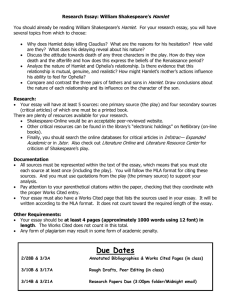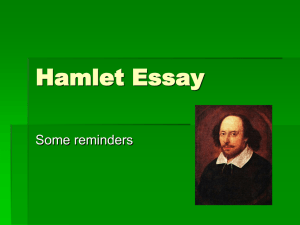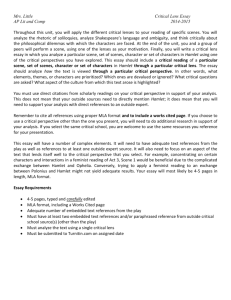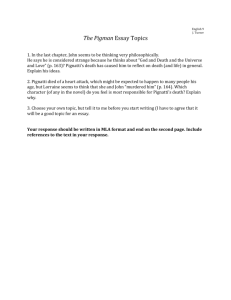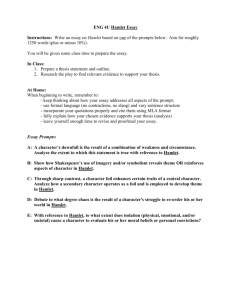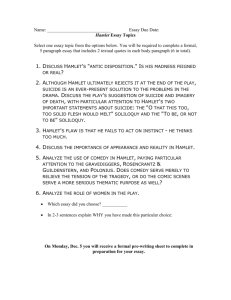Research Essay Topics
advertisement
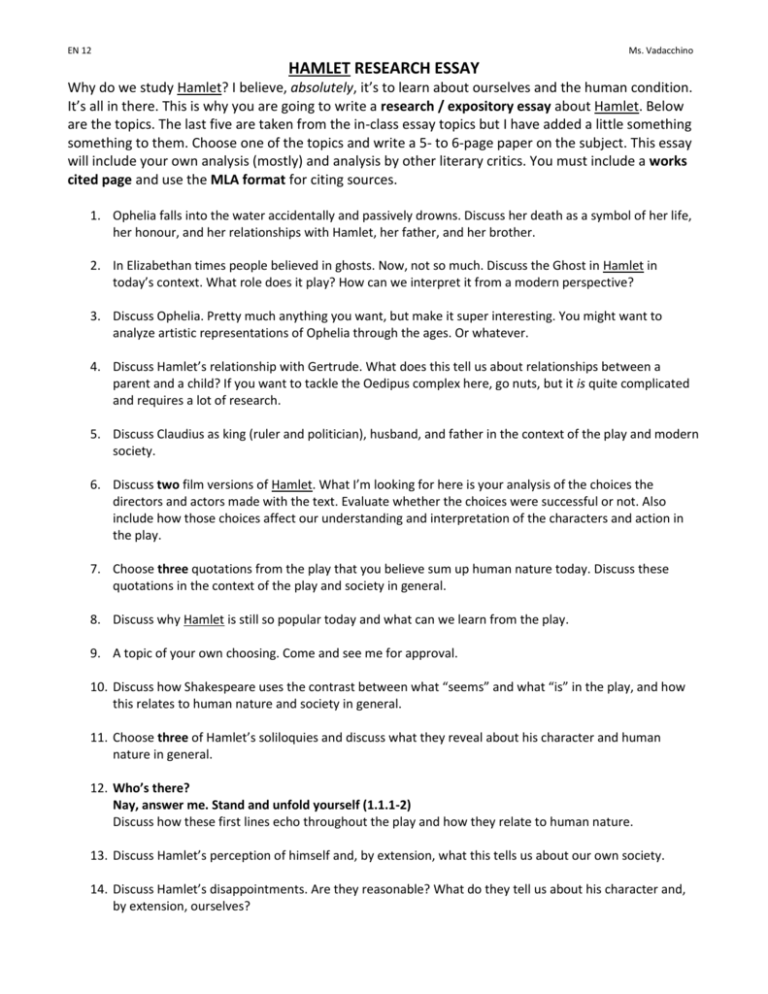
EN 12 Ms. Vadacchino HAMLET RESEARCH ESSAY Why do we study Hamlet? I believe, absolutely, it’s to learn about ourselves and the human condition. It’s all in there. This is why you are going to write a research / expository essay about Hamlet. Below are the topics. The last five are taken from the in-class essay topics but I have added a little something something to them. Choose one of the topics and write a 5- to 6-page paper on the subject. This essay will include your own analysis (mostly) and analysis by other literary critics. You must include a works cited page and use the MLA format for citing sources. 1. Ophelia falls into the water accidentally and passively drowns. Discuss her death as a symbol of her life, her honour, and her relationships with Hamlet, her father, and her brother. 2. In Elizabethan times people believed in ghosts. Now, not so much. Discuss the Ghost in Hamlet in today’s context. What role does it play? How can we interpret it from a modern perspective? 3. Discuss Ophelia. Pretty much anything you want, but make it super interesting. You might want to analyze artistic representations of Ophelia through the ages. Or whatever. 4. Discuss Hamlet’s relationship with Gertrude. What does this tell us about relationships between a parent and a child? If you want to tackle the Oedipus complex here, go nuts, but it is quite complicated and requires a lot of research. 5. Discuss Claudius as king (ruler and politician), husband, and father in the context of the play and modern society. 6. Discuss two film versions of Hamlet. What I’m looking for here is your analysis of the choices the directors and actors made with the text. Evaluate whether the choices were successful or not. Also include how those choices affect our understanding and interpretation of the characters and action in the play. 7. Choose three quotations from the play that you believe sum up human nature today. Discuss these quotations in the context of the play and society in general. 8. Discuss why Hamlet is still so popular today and what can we learn from the play. 9. A topic of your own choosing. Come and see me for approval. 10. Discuss how Shakespeare uses the contrast between what “seems” and what “is” in the play, and how this relates to human nature and society in general. 11. Choose three of Hamlet’s soliloquies and discuss what they reveal about his character and human nature in general. 12. Who’s there? Nay, answer me. Stand and unfold yourself (1.1.1-2) Discuss how these first lines echo throughout the play and how they relate to human nature. 13. Discuss Hamlet’s perception of himself and, by extension, what this tells us about our own society. 14. Discuss Hamlet’s disappointments. Are they reasonable? What do they tell us about his character and, by extension, ourselves? EN 12 Ms. Vadacchino Your analysis The bulk of this essay should be your analysis of the play. You must include a well-formatted thesis statement in your introductory paragraph that the rest of the essay sets out to prove. Literary Critics You must research what other literary critics have written about Hamlet. This should not be difficult because everybody has written about Hamlet. The difficulty is finding something that is appropriate and relevant to your essay. You do not have to agree with what the critics and scholars have written, but you must incorporate some of their ideas into your essay and cite them using the MLA format. You must have a minimum of three sources for this. All your sources must come from scholarly, legitimate texts or websites. No Wikipedia or Spark Notes, etc. No dot coms (only dot org or dot edu). No blogs by some dude who thinks Ophelia is hot. Use databases. You must use in-text citations (aka parenthetical citations) to cite your sources in your essay. Note: A fourth source must be the play itself. Include your text of Hamlet in your Works Cited page and correctly cite line numbers in your essay. Works Cited The last page of your essay must be a Works Cited page where you list all your sources alphabetically. Be sure to follow the MLA format for this page. How do you do this? Here’s an example of my own analysis of Robert Frost’s poem “The Road Not Taken”, quotation integration from the poem, a literary critic’s analysis, in-text citation, and Works Cited. I have used a book as my source. In Frost’s poem “The Road Not Taken”, the author places the speaker at the centre of the poem, emphasizing that action is important in life, not passivity and waiting for the right decision to present itself. The poem begins with two roads “diverg[ing] in a yellow wood” and the speaker must choose which road to take. The speaker spends most of his time in the poem trying to choose the best option, the best road, and his hesitation and wavering mirrors every person’s anxiety at making the ‘right’ decision. However, this poem is not about ‘right decisions’ at all; rather, it seems to be about “an individual’s choices and experiences” and the importance of those experiences (Fagan 294). OR However, this poem is not about ‘right decisions’ at all; rather, as Dierdre Fagan writes, it seems to be about “an individual’s choices and experiences” and the importance of those experiences (294). *****(DO NOT bold in-text citations in your essay. I’m doing it here for emphasis.)***** Works Cited Fagan, Dierdre. Critical Companion to Robert Frost: A Literary Reference to His Life and Work. New York: Infobase Publishing, 2007. Print. EN 12 Ms. Vadacchino Here’s another example I’ve written about Macbeth using an article from a journal that I accessed online using Harvard’s database, DASH. Macbeth is unique among Shakespeare’s tragedies in that there is no subplot. There are no distractions from Macbeth’s descent into his own psychological hell. The play parallels the other tragedies, however, in its black comedy. It is an aspect of the tragedies that many readers overlook, but as Daniel Albright explains, “Part of the power of Shakespeare’s tragedies lies in their goofiness” (225). This is what makes Billy Morrissette’s film version of the play so successful. His film, titled Scotland, PA, is hilariously set in a 1970s diner, appropriately named “Duncan’s”, where the eponymous owner is murdered by Macbeth and his wife by way of deep fryer. OR It is an aspect of the tragedies that many readers overlook; however, “Part of the power of Shakespeare’s tragedies lies in their goofiness” (Albright 225). Works Cited Albright, Daniel. “The Witches and the witch: Verdi’s Macbeth.” Cambridge Opera Journal 17.3 (2005): 225-252. DASH. Web. 30 Mar 2014. Scotland, PA. Dir. Billy Morrissette. 2001. Lot 47 Films, 2002. DVD. Notice that EVERYTHING IS DOUBLE SPACED! This is not my preference; it’s what you HAVE TO DO according to the MLA guide. Where can you find out how to use the MLA format? 1. The Templeton library has a copy of the MLA Handbook for Writers of Research Papers 7th ed. 2. You may use Ms. Vadacchino’s copy of the handbook which is in her classroom - in her classroom! 3. Many websites offer their own quick version of the MLA format. I think these are the best: a. http://www.lib.sfu.ca/help/writing/mla#ws I think this is the clearest one. b. http://www.library.mun.ca/guides/howto/mla.php c. https://owl.english.purdue.edu/owl/resource/747/01/ d. A quick guide: http://www.cscc.edu/library/mla.pdf 4. Ask me, but honestly, I’m not very good at this and it gives me a headache. Just make sure when you are doing your research and you want to quote someone or use his or her idea, WRITE DOWN WHERE YOU GOT IT FROM. WRITE EVERYTHING YOU CAN ABOUT THE SOURCE.
